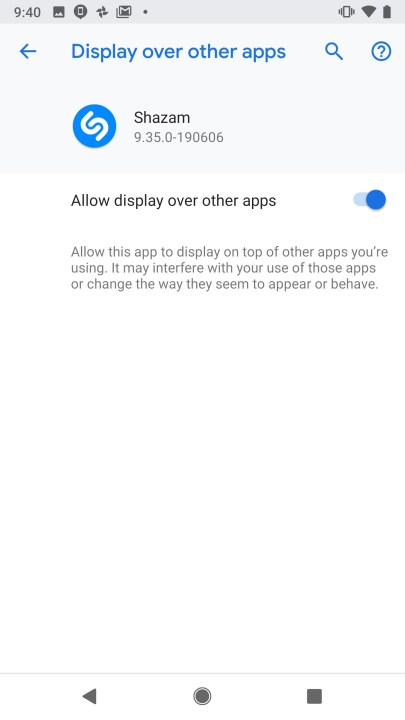Despite the fact that Apple completed its acquisition of music-ID app Shazam last year, the coolest new Shazam feature is, for now, an Android exclusive. Pop-Up for Shazam can detect songs being played on a device without having to use the microphone. Instead, it effectively digitally eavesdrops on other apps that are running and acquires the signal it needs to identify songs directly. The big benefit to this capability is that you can now leave your headphones on, while Shazam runs in the background, doing its thing.
In the past, on both iOS and Android devices, Shazam users have needed to yank an earbud out and position it close to the microphone or disconnect their headphones entirely to let the music escape through their device’s built-in speaker. Android users can elect to keep Shazam in permanent listening mode — similar to iOS’ “always on” feature — but that listening can now be direct from app to app, as well as via the device’s mic.
The feature can be used in two different ways. While using an app that supports background listening, like Spotify, you can switch over to Shazam and it will detect what Spotify is playing even with headphones on. However, not all apps keep playing when you switch, so you’ll need to enable Pop-Up Shazam in Shazam’s settings, and then activate it from the Android pull-down menu. Doing this surfaces a Shazam icon, which floats above your apps, ready to be tapped whenever you want to ID a song.
In our brief testing, it worked on Spotify, YouTube Music, and the main YouTube app itself. As with the regular Shazam interface, songs were recognized after only a handful of notes.
We initially questioned the value of having Shazam identify songs that were playing on our device; after all, if you can look at the app that’s playing the music, it’s probably displaying the track information already. Do you really need Shazam to confirm what you already know? But there are two good reasons for using it: First, Shazam will keep track of all the songs you ID, effectively building a kind of cross-app Last.fm-style scrobble. Second, the pop-up icon will start to spit out song lyrics after it IDs the track, giving you lyrics access from all of your apps whether they have this feature or not. Amusingly, Shazam’s lyrics kept on rolling even after we hit pause on the song that triggered it.
It’s unknown when or if pop-up Shazam will make it to iOS. The Android implementation relies on that operating system’s ability to grant one app access to another app’s data, something that iOS places heavier restrictions on.










